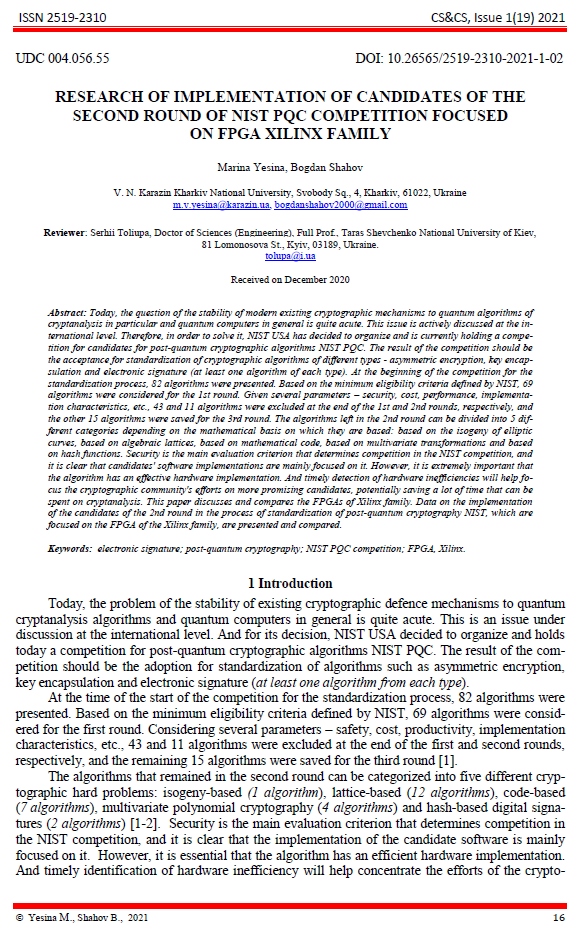Дослідження реалізацій кандидатів другого раунду конкурсу NIST PQC, що орієнтовані на сімейства FPGA Xilinx
Анотація
Today, the question of the stability of modern existing cryptographic mechanisms to quantum algorithms of cryptanalysis in particular and quantum computers in general is quite acute. This issue is actively discussed at the international level. Therefore, in order to solve it, NIST USA has decided to organize and is currently holding a competition for candidates for post-quantum cryptographic algorithms NIST PQC. The result of the competition should be the acceptance for standardization of cryptographic algorithms of different types - asymmetric encryption, key encapsulation and electronic signature (at least one algorithm of each type). At the beginning of the competition for the standardization process, 82 algorithms were presented. Based on the minimum eligibility criteria defined by NIST, 69 algorithms were considered for the 1st round. Given several parameters – security, cost, performance, implementation characteristics, etc., 43 and 11 algorithms were excluded at the end of the 1st and 2nd rounds, respectively, and the other 15 algorithms were saved for the 3rd round. The algorithms left in the 2nd round can be divided into 5 different categories depending on the mathematical basis on which they are based: based on the isogeny of elliptic curves, based on algebraic lattices, based on mathematical code, based on multivariate transformations and based on hash functions. Security is the main evaluation criterion that determines competition in the NIST competition, and it is clear that candidates' software implementations are mainly focused on it. However, it is extremely important that the algorithm has an effective hardware implementation. And timely detection of hardware inefficiencies will help focus the cryptographic community's efforts on more promising candidates, potentially saving a lot of time that can be spent on cryptanalysis. This paper discusses and compares the FPGAs of Xilinx family. Data on the implementation of the candidates of the 2nd round in the process of standardization of post-quantum cryptography NIST, which are focused on the FPGA of the Xilinx family, are presented and compared.
Завантаження
Посилання
J.-S. Coron, A. Joux, Cryptanalysis of a provably secure cryptographic hash function, Cryptology ePrint Archive Report 2004/013, 2004. http://eprint.iacr.org/2004/013
Post-quantum cryptography, round 2 submissions. [Електронний ресурс]. – Режим доступу: https://csrc.nist.gov/projects/post-quantum-cryptography/round-2-submissions.
Malik Imran A Systematic Study of Lattice-based NIST PQC Algorithms: from Reference Implementations to Hardware Accelerators / Malik Imran, Zain Ul Abideen, Samuel Pagliarini //. – Режим доступу: https://arxiv.org/pdf/2009.07091.pdf.
Viet Ba Dang Implementation and Benchmarking of Round 2 Candidates in the NIST Post-Quantum Cryptography Standardization Process Using Hardware and Software/Hardware Co-design Approaches / Viet Ba Dang, Farnoud Farahmand, Michal Andrzejczak, Kamyar Mohajerani, Duc Tri Nguyen, Kris Gaj //. – Режим доступу: https://eprint.iacr.org/2020/795.pdf.
И. Тарасов ПЛИС Xilinx и Цифровая обработка Сигналов Особенности, преимущества, перспективы. – Режим доступу: https://www.electronics.ru/files/article_pdf/2/article_2788_434.pdf.
Xilinx. 7 Series Product Selection Guide. [Електронний ресурс]. – Режим доступу: https://www.xilinx.com/support/documentation/selection-guides/7-series-product-selection-guide.pdf.
Farnoud Farahmand et al. Software/Hardware Codesign of the Post Quantum Cryptography Algorithm NTRUEncrypt Using High-Level Synthesis and Register-Transfer Level Design Methodologies. In: 29th International Conference on Field Programmable Logic and Applications, FPL 2019. Barcelona, Spain: IEEE, Sept. 2019, pp. 225–231. ISBN: 978-1-72814-884-7. DOI: 10.1109/FPL.2019.00042.
Kris Gaj Challenges and Rewards of Implementing and Benchmarking Post-Quantum Cryptography in Hardware. In: 2018 Great Lakes Symposium on VLSI, GLSVLSI 2018. Chicago, IL, USA: ACM Press, 2018, pp. 359–364. ISBN: 978-1-4503-5724-1. DOI: 10/ggbscs.
Jens-Peter Kaps et al. Lightweight Implementations of SHA-3 Candidates on FPGAs. In: 12th International Conference on Cryptology in India, Indocrypt 2011. Vol. 7107. LNCS. Chennai, India, Dec. 2011, pp. 270–289. ISBN: 978-3-642-25577-9 978-3-642-25578-6. DOI: 10.1007/978-3-642-25578-6_20. – Режим доступу: https://2011.indocrypt.org/slides/gurung.pdf.
Viet B Dang et al. Implementing and Benchmarking Three Lattice-Based Post-Quantum Cryptography Algorithms Using Software/Hardware Codesign. In: 2019 International Conference on Field Programmable Technology, FPT 2019. Tianjin, China: IEEE, Dec. 9-13, 2019, pp. 206–214. DOI: 10.1109/ICFPT47387.2019.00032.


